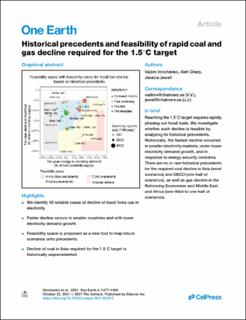Historical precedents and feasibility of rapid coal and gas decline required for the 1.5°C target
Journal article, Peer reviewed
Published version

Åpne
Permanent lenke
https://hdl.handle.net/11250/2986555Utgivelsesdato
2021Metadata
Vis full innførselSamlinger
- Department of Geography [634]
- Registrations from Cristin [9791]
Sammendrag
A major challenge in combatting climate change is stopping the use of fossil fuels such as coal in electricity generation. This is particularly challenging in Asia—the largest global region with rapidly growing electricity demand—where coal is widely used. Fast transitions to low-carbon power sources are needed, yet it is unclear whether historical precedents for such transitions exist. The most similar shifts away from fossil fuels occurred in the 1970s and 1980s, when rapidly growing Western countries replaced oil with nuclear power and coal. Other cases of rapid decline in large countries involved switching one fossil fuel to another or in post-socialist countries following the collapse of the Soviet Union. More recently, the Organisation for Economic Co-operation and Development (OECD) countries have been successfully replacing coal with renewables, but electricity demand growth is lower in these countries, and fossil fuel power plants are generally older. The findings from the study indicate that an unprecedented effort will be required to decarbonize Asia's energy sector and meet climate targets.
